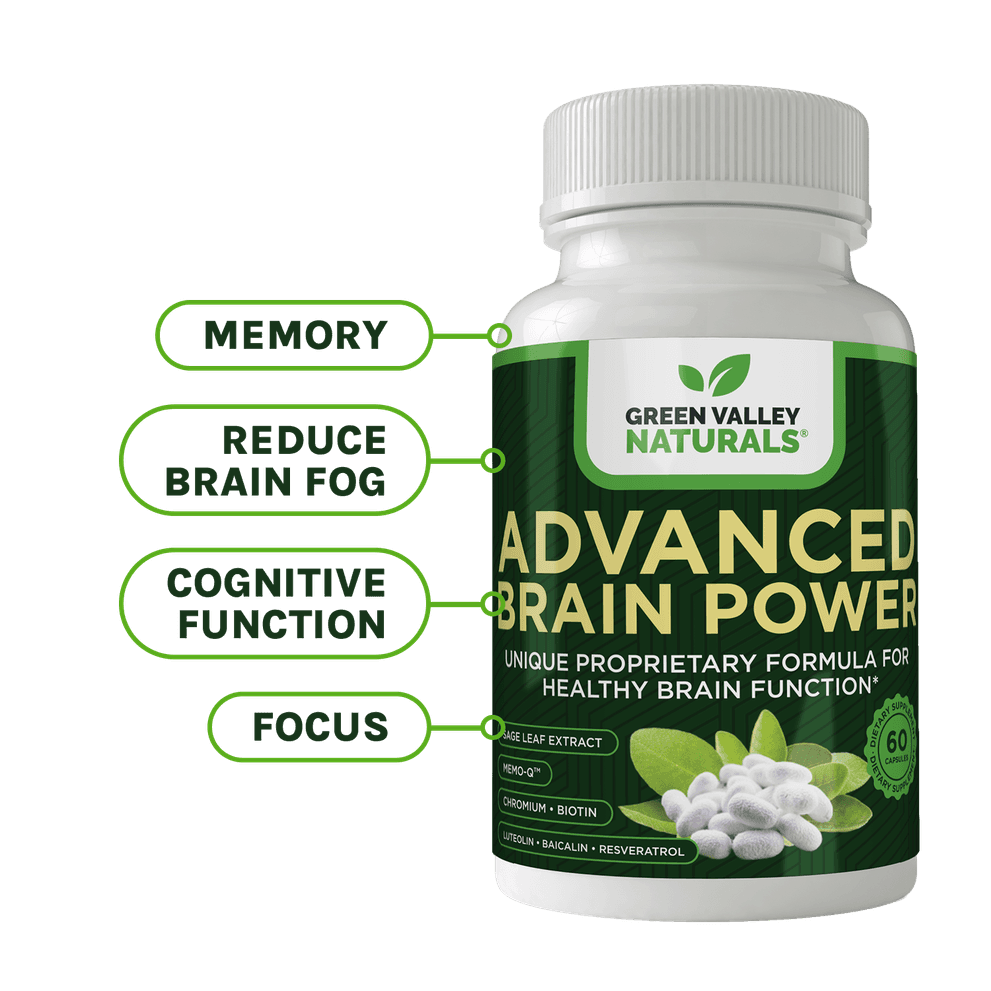
10 Foods That Reduce Brain Fog for Clearer Thinking and Focus
Ever feel like your thoughts are moving through molasses? You’re not imagining it. Brain fog is surging—and the fix may be as simple (and delicious) as what’s on your plate. Inside, discover how a handful of research-backed foods can sharpen focus, steady energy, and clear the mental haze.
Key Takeaways
Brain fog affects cognitive function through multiple pathways, but nutrition can help combat symptoms
Specific foods rich in antioxidants, omega-3s, and other key nutrients support brain health and mental clarity
Recent studies show that adherence to brain-healthy eating patterns like the MIND diet is linked to reduced brain fog severity
Understanding Brain Fog and Food's Impact on Brain Function
If you've ever found yourself staring at your computer screen, struggling to remember what you were just thinking about, or feeling like your mind is wrapped in cotton, you're not alone. Brain fog has become an increasingly common complaint in our fast-paced, always-connected world—and recent research shows it's affecting more people than ever before.
A groundbreaking 2024 study found that brain fog, characterized by cognitive difficulties such as memory impairment, lack of focus, and mental fatigue, has become a particularly common symptom during recovery from COVID-19, with rates significantly higher in individuals who had the infection. But you don't need to have had COVID to experience these frustrating symptoms.
The good news? Recent research from 2022 demonstrates that dietary habits and specific nutrients play an essential role in brain health, and the foods you choose can make a real difference in how clearly you think and how well you focus.
The Science Behind Nutrition and Brain Health
Brain fog isn't just feeling a little tired—it's a collection of cognitive symptoms that can significantly impact your daily life. You might experience difficulty concentrating during important meetings, forgetting where you placed your keys (again), or feeling mentally exhausted after simple tasks. While brain fog isn't a medical diagnosis itself, it often signals that something in your body needs attention.
The Brain-Diet Connection
The connection between what we eat and how we think is more profound than many people realize. Your brain consumes about 20% of your daily caloric intake, making it one of your body's most energy-demanding organs. When you fuel it with processed foods, excess sugar, and inflammatory ingredients, you're essentially asking a high-performance engine to run on low-quality fuel.
Harvard nutritionist and psychiatrist Dr. Uma Naidoo emphasizes that food and nutrition are invaluable tools for relieving anxiety, boosting focus, and improving overall mental health. Her research shows that micronutrients with antioxidant and anti-inflammatory properties can protect your brain from long-term decline while helping produce and regulate mood chemicals like dopamine and serotonin.
The Overlooked Gut-Brain Axis
Your brain is approximately 60% fat, which means the quality of fats you consume directly impacts brain structure and function. According to Dr. Naidoo's research, a steady supply of healthy fats is one of the most important factors in keeping your brain healthy and free of anxiety.
Recent research on the gut-brain axis has revealed a bidirectional communication network between the central and enteric nervous systems, linking the brain's emotional and cognitive centers with digestive health. This connection helps explain why digestive issues often accompany brain fog, and why improving gut health can lead to clearer thinking.
The trillions of bacteria in your gut produce neurotransmitters including serotonin and dopamine—chemicals essential for mood regulation and cognitive function. When your gut microbiome is imbalanced, it can directly affect your mental clarity and focus.
For optimal brain health, focus on a diet centered around vegetables, fruits, whole grains, lean proteins, and healthy fats—while minimizing sugar, processed seed oils, packaged foods, and frequent restaurant meals. This approach provides your brain with the nutrients it needs to function at its best. But the research begs the question, which foods are best?
10 Foods That Enhance Memory and Cognitive Function
1. Blueberries: Nature's Brain Boosters
A 2023 study from King's College London found that eating just 75 blueberries daily (about a handful) could strengthen cognitive and cardiovascular health. The research showed that wild blueberry powder containing 302 milligrams of anthocyanins improved vascular and cerebral blood flow.
Extensive research published in 2020 and confirmed in multiple 2024 studies shows that blueberries' anthocyanins provide anti-inflammatory and antioxidant actions with beneficial effects on vascular and brain function. These compounds have been linked to improved cognitive performance in elderly adults and better task switching with reduced memory interference.
Why they work: Studies demonstrate that blueberry anthocyanins can penetrate the blood-brain barrier and exhibit neuroprotective properties including inhibiting harmful protein aggregation, scavenging free radicals, and supporting neuroplasticity.
2. Fatty Fish: Omega-3 Powerhouses
A comprehensive 2022 systematic review analyzing nine randomized controlled trials found that omega-3 fatty acid ingestion increases learning, memory, cognitive well-being, and blood flow in the brain. The research showed these treatments are advantageous, well-tolerated, and risk-free.
Recent meta-analyses from 2023 suggest that fish intake is associated with a reduction in development of mild cognitive decline and Alzheimer's disease. Supplementation with docosahexaenoic acid (DHA) in randomized controlled trials showed benefits for cognitive function in those with mild cognitive impairment.
Salmon, sardines, mackerel, and anchovies provide EPA and DHA—the omega-3 fatty acids most beneficial for brain health. Research shows that omega-3 fatty acids help improve brain cell health, facilitate better communication within your brain, and support cognition, all of which can help people suffering from brain fog.
3. Pumpkin Seeds and Walnuts: Mineral-Rich Brain Food
Walnuts contain alpha-linolenic acid (ALA), a plant-based omega-3 fatty acid that supports brain health, plus antioxidants that protect brain cells from oxidative damage. Pumpkin seeds are loaded with magnesium, zinc, iron, and copper—minerals essential for neurotransmitter function and mood regulation.
A 2023 study published in Brain Sciences found associations between omega-3 fatty acid levels and both brain volume and cognitive performance in older adults. This research supports the importance of including both marine and plant-based omega-3 sources in your diet.
4. Eggs: Choline Champions
Eggs provide choline, a nutrient vital for acetylcholine production—a neurotransmitter crucial for memory formation and focus. They also contain B vitamins that support brain energy metabolism. The combination makes eggs an ideal breakfast food for maintaining mental clarity throughout the morning.
5. Dark Chocolate: Flavonoid-Rich Focus Food
Harvard research recommends extra dark natural chocolate as a source of iron with antioxidant properties. When paired with vitamin C-rich foods like oranges, the iron absorption is maximized, supporting optimal brain function.
Choose chocolate that's 70% cacao or higher to maximize flavonoid content while minimizing added sugars. The combination of flavonoids, natural caffeine, and theobromine can improve focus and mood while supporting blood flow to the brain.
6. Leafy Greens: Folate and Beyond
Spinach, kale, Swiss chard, and other dark leafy greens provide folate, vitamin K, and lutein—nutrients linked to slower cognitive decline. Research shows that leafy greens help with mental fatigue and brain fog through their rich B vitamin content, which plays crucial roles in synthesizing neurotransmitters that support brain function.
These vegetables also support healthy blood flow and natural detoxification processes, helping your brain function more efficiently.
7. Fermented Foods: Gut-Brain Connection Supporters
Recent research highlights the crucial role of gut health in brain fog, with studies showing that the gut-brain axis influences mental clarity through neurotransmitter production. Kimchi, sauerkraut, miso, kefir, and yogurt with live cultures provide beneficial bacteria that support this connection.
These probiotics help produce neurotransmitters in your gut that directly influence mood, cognition, and mental clarity. Regular consumption of fermented foods can help reduce anxiety and depression while supporting cognitive function.
8. Turmeric: Anti-Inflammatory Spice
Turmeric's active compound, curcumin, can cross the blood-brain barrier and provides powerful anti-inflammatory effects. Research from 2022 shows that chronic inflammation contributes to cognitive decline and brain fog, making anti-inflammatory foods crucial for brain protection.
Curcumin also supports neurogenesis—the formation of new brain cells—and may help improve blood flow to the brain while reducing oxidative stress.
9. Green Tea: L-Theanine and Antioxidants
Green tea provides a unique combination of caffeine and L-theanine, an amino acid that promotes calm focus without jitters. This combination can improve attention and cognitive performance while providing powerful antioxidants that protect brain cells.
The moderate caffeine content (about 30-50mg per cup) provides gentle stimulation, while L-theanine helps prevent the anxiety and crashes often associated with coffee consumption.
10. Lean Proteins: Neurotransmitter Building Blocks
Often overlooked in brain health discussions, lean proteins like chicken, turkey, and fish provide essential amino acids needed for neurotransmitter production. These foods help maintain balanced blood sugar levels, preventing the energy crashes that contribute to brain fog.
Protein also supports the production of dopamine and norepinephrine—neurotransmitters essential for focus, motivation, and mental clarity.
Additional Brain Fog Fighters
MCT Oil: A 2023 hypothesis published in medical research suggests that medium-chain triglyceride supplementation may help speed cognitive recovery, particularly for post-COVID brain fog, by providing an alternative fuel source for the brain.
Whole Grains: Oats, quinoa, and brown rice provide steady glucose to fuel brain function without causing blood sugar spikes that can worsen brain fog.
Avocados and Olive Oil: Research confirms these anti-inflammatory fats promote good gut and metabolic health while supporting brain function.
Lifestyle Factors That Enhance Brain Function
That study published in 2022 found that not eating enough nutrients can increase the risk of nutritional deficiencies, some of which may cause brain fog. The study also noted that nutritional deficiencies could contribute to anxiety and depression, both of which can negatively affect brain function. Of course, the right nutrition works best when combined with other brain-healthy habits. Studies show it's a good idea to:
Exercise Regularly: Physical activity improves blood flow to the brain and reduces inflammation while promoting the production of brain-derived neurotrophic factor (BDNF), which supports new brain cell growth.
Prioritize Sleep: Sleep quality research from 2022 shows a direct relationship between sleep disturbances and brain fog severity. Aim for 7-9 hours of quality sleep to help consolidate memories and clear metabolic waste from your brain.
Manage Stress: Recent research indicates that chronic stress may lead to elevated cortisol, disrupting neurotransmitter balance and worsening mental fog. Consider meditation, deep breathing exercises, or yoga to help manage stress levels.
Stay Hydrated: Even mild dehydration can affect cognitive function. Aim for adequate water intake throughout the day to support optimal brain function.
Making It Work in Real Life
Start small by incorporating one or two brain-healthy foods into your daily routine. Try adding a handful of blueberries to your morning oatmeal, including fatty fish in two meals per week, or swapping your afternoon snack for a handful of walnuts.
As Harvard's Dr. Naidoo recommends, "Listen to your body. If you feel cranky, irritable, hungry, or jumpy after eating certain foods, try cutting them out of your diet. If something doesn't make you feel good after eating it, it's probably not good for you."
Summary
Brain fog—marked by sluggish thinking, poor focus, and memory lapses—has become increasingly common, especially post-illness and in high-stress, high-sugar lifestyles. New research ties diet quality to cognitive clarity: antioxidants, omega-3s, key vitamins/minerals, and gut-friendly foods support healthy brain signaling, blood flow, and balanced neurotransmitters. This article explains how everyday choices (blueberries, fatty fish, leafy greens, fermented foods, turmeric, green tea, nuts/seeds, eggs, lean proteins, and whole-grain staples) can help reduce brain fog while pairing nutrition with sleep, movement, hydration, and stress management for lasting results.
Frequently Asked Questions
What is the best thing to eat for brain fog?
While no single food can cure brain fog, blueberries show the strongest research support for cognitive benefits, particularly when consumed daily. However, a varied diet including omega-3 rich foods, leafy greens, and anti-inflammatory options provides the best overall approach.
How do you get rid of brain fog fast?
Recent research suggests that dietary interventions combined with good sleep hygiene and stress management provide the most effective approach. Focus on stable blood sugar through balanced meals, adequate hydration, and avoiding inflammatory foods.
What deficiency causes brain fog?
Multiple nutritional deficiencies can contribute to brain fog, including omega-3 fatty acids, B vitamins (particularly B12, B6, and folate), vitamin D, iron, and magnesium.
What vitamin is good for brain fog?
B vitamins, particularly B12, B6, and folate, play crucial roles in neurotransmitter synthesis and brain energy metabolism. Vitamin D and omega-3 fatty acids also show strong research support for cognitive function.
What is the #1 worst eating habit for memory loss?
Research consistently shows that diets high in added sugars and processed foods are most detrimental to brain health. These foods cause inflammation, blood sugar instability, and provide little nutritional value for brain function.
Remember, clearing brain fog isn't about perfection—it's about making consistent, sustainable changes that support your brain's natural ability to focus, remember, and process information clearly. Start with the foods that appeal to you most, and gradually build a brain-healthy eating pattern that fits your lifestyle.



